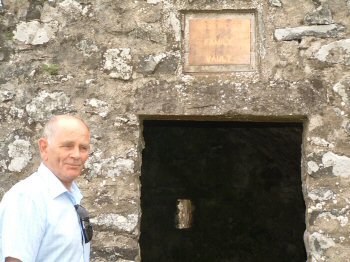For many years the exact position of the O’Neill Vault was a subject of speculation.
It was known that c. 1820 the Rev Rector Charles Atkinson decided to brick up the doorway of the Vault.
Over the following years the exact location of the doorway was forgotten. In 1971 a number of workmen preparing the graveyard for Art McCooey’s bicentenary accidentally uncovered the entrance.
In tribute, on 29th April 1973 a new plaque was unveiled by Senorita Conchita O’Neill of
Poets and Scholars
Creggan is sometimes referred to as Ceanlar na nAmbran (place of songs) and also as Ceanlar na bhFili (District of Poets). For a time it played an important part in
Art McCooey
This gaelic poet was born in Ballinaght in the parish of Creggan in 1738. On his father’s death the family holding was divided between him and his brother Terence. The poet, a hard-drinking womaniser, squandered his inheritance.
It was also his womanising ways that led to his excommunication from the Church. Art fell out with the parish priest of the time, Fr Terence Quinn (also burid in Creggan – 1715-1775) who disallowed Art’s marriage to his second cousin. Undeterred Art approached the Protestant rector, Rev Hugh Hill and the ceremony was completed. Art composed a scathing poem in criticism of Fr Quinn’s housekeeper (and sister). It was called Blind Mary Quinn – because the lady in question had an eye defect!
He was forced into internal exile in Howth. Many years later on his return, in order to keep in with the priest and the Roman Catholic Church, he had to write a second poem (a palinode) in praise of the same lady. To demonstrate his unhappiness over this to his educated readership, he went to false extremes in singing her praises!
Urchaill an Creggain is McCooey’s most famous poem. Local tradition suggests it was written when he spent a night hidden in the O’Neill Vault in Creggan. In much of his poetry Art referred to the O’Neills. He often lamented their downfall and the destruction of
Art was just 35 years old when he died on 3 January 1773. His legacy is the insight his poetry gives us of the lives and lifestyles of the people of his time.
